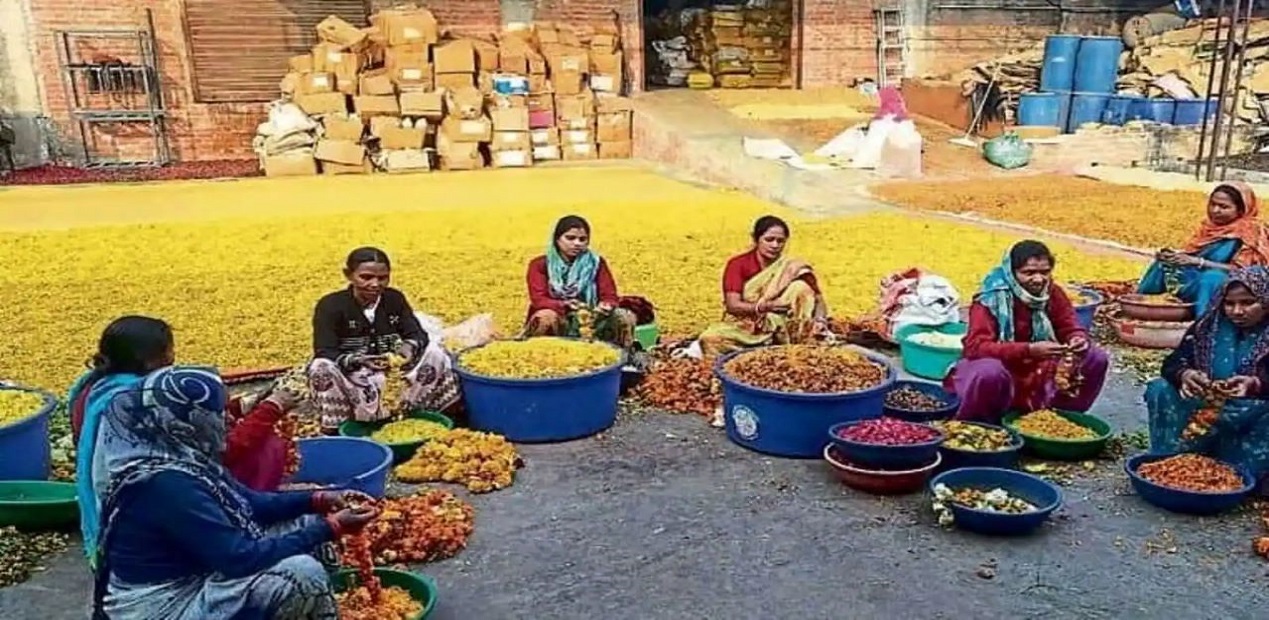In Bharat, flowers are one of the essential elements in prayers offered by millions of people daily. Apart from religious activities, floral consumption also occurs in the textile, medicine, and perfume industries. According to the data from the International Agribusiness Management Institute, over 800 million metric tonnes of flowers are offered by people across various religious places in Bharat. Out of 800 million tonnes, around 8 million flowers are dumped in river streams, including the sacred Ganga river. As the flowers rot, they fill the rivers with waste and toxins from pesticides, such as arsenic, lead, and cadmium, further causing pollution and enormous water-borne diseases.
Incorporated in 2017 as Kanpur Flowercycling Private Limited, “Phool.Co” is one of the significant initiatives towards a vision of clean rivers and flora waste management. Ankit Agarwal and Prateek Kumar co-founded the “Phool” biomaterial start-up in Kanpur, Uttar Pradesh. The idea behind Phool is to collect flower waste from religious sites across Bharat and handcraft them into valuable products such as incense sticks, incense cones, and vermicompost, aka “Mitti”. Mitti is a mineral-rich shot of nutrients and enzymes that energise the soil. From start to finish, 'Mitti' is produced using natural techniques, has no carbon footprint, and is devoid of all chemicals and carcinogens. Started from Kanpur, Phool.co, as of July 2023, has six units converting floral waste across temples in cities including Varanasi, Kanpur, Ayodhya, Tirupati, Mathura and Badrinath; over 11,000 metric tonnes of flower waste have been flower-cycled. This has also had an associated positive affect, mothers who were employed with the Phool.co have been able to afford sending their children to attend school for education.
Flowers, incense, and other religious items come in plastic packaging adorned with images of the gods. Devotees do not want to throw away this packaging, so they either leave it under trees or immerse it in bodies of water. As a result, the packaging thrown into the water pollutes it. Phool.co devised a solution to address the challenge of packaging waste. They have designed a compostable package utilising seed paper laced with Tulsi or Holy Basil, seeds, and ink derived from vegetable colours. After using the incense or flowers, users need to unfold the wrapping paper, bury it in a pot with dirt, water it regularly, and watch the seeds emerge into a Tulsi plant.
The incorporation of Phool.co not only created a productive way to manage the discarded flowers but also provided an opportunity for job creation for marginalised women working as manual scavengers. Phool.co employed 1,200 women in 2018, aiming to engage over 6,000 female flowercyclers in the coming years. Women with "Phool.co" are self-assured, with a monthly income of ₹7,000, individual bank accounts, access to health insurance, and a healthy lifestyle. In July 2021, UNESCO’s Green Citizens initiative recognised the Phool.co’s flower-cycling project as a “Story of Change”. Phool.co has also been selected for the the United Nations Global Climate Action Awards 2023. The goal of the 2023 awards is to bring attention to the creative climate action that young people worldwide are undertaking to make their communities more resilient, sustainable, and equitable places to live in. The UN Climate Change Conference (COP 28) in Expo City, Dubai, United Arab Emirates from from November 30 to December 12, 2023, will honour the 2023 award winners.
(The paper is the author’s individual scholastic articulation. The author certifies that the article/paper is original in content, unpublished and it has not been submitted for publication/web upload elsewhere, and that the facts and figures quoted are duly referenced, as needed, and are believed to be correct). (The paper does not necessarily represent the organisational stance... More >>
Image Source: https://www.thehindu.com/life-and-style/from-flower-to-leather/article32759437.ece











Post new comment